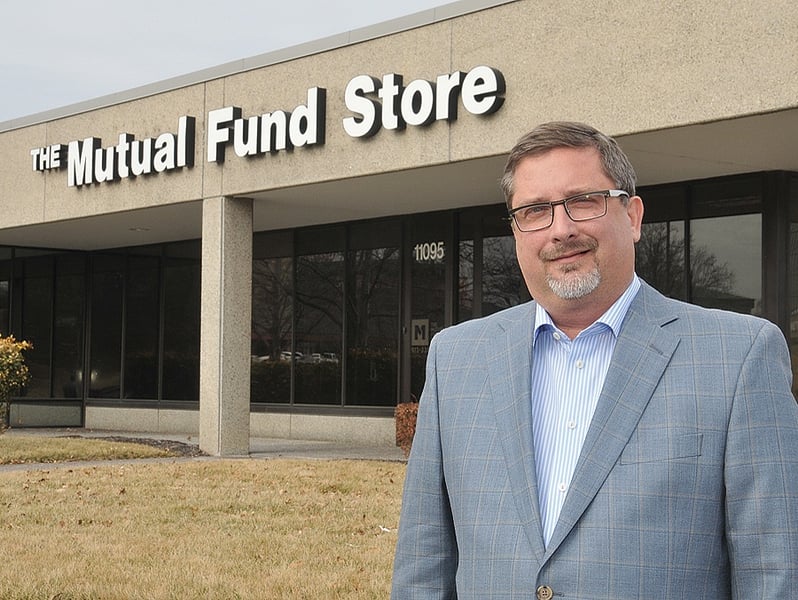Three years after taking over leadership of The Mutual Fund Store from its charismatic, straight-shooting founder, Adam Bold, John Bunch is starting to make his mark by expanding its products and services.
The company is expanding its financial planning practice, has added exchange-traded funds to its menu of investments and this month bought an insurance company. And in the next three to five years, it could go public.
The Mutual Fund Store, based in Overland Park, Kan., is a nationwide operation, standing nearly alone as an established brand in the balkanized industry of mom-and-pop registered investment advisers.
The firm was the brainchild of Mr. Bold, who started it in 1996 and filled its client list with adoring listeners who called into his weekly radio program, The Mutual Fund Show.
The company accumulated assets in simple portfolios of mutual funds it built and sold to clients with account balances in the thousands, not millions, slowly crafting a chain of dozens of company- and franchisee-owned storefronts.
Its business model is more akin to the Subway sandwich chain than the average fee-only RIA, an industry channel in which it ranks 10th as measured by assets under management, according to
InvestmentNews' database of fee-only RIAs.
Under Mr. Bunch, a former Charles Schwab Corp. and TD Ameritrade executive installed after the private equity firm Warburg Pincus bought a controlling interest in 2011, The Mutual Fund Store is expanding its range of products and services.
While the company has always offered some type of financial planning, Mr. Bunch wants to expand the number of plans sold to 38,000 in 2015 from 10,000 last year. It recently began offering ETFs, and its acquisition of Stuart Woodbury Insurance Inc. in Liberty, Mo., allows it to offer term-life policies more readily.
He said that The Mutual Fund Store next wants to bring health-insurance planning to the table.
BROKERAGE VETERAN
Mr. Bunch, described as a jovial, competent skipper by subordinates and competitors, is a brokerage veteran. He ran a network of retail branches for Schwab, The Mutual Fund Store's primary custodian.
“Many advisers won't offer insurance because of the potential perception of conflict related to commissions,” said David DeVoe, a former Schwab manager who now heads his own financial services consulting firm.
Mr. Bunch said the ethical standards of advisers remain a primary concern as he moves into insurance sales, so stores and individual advisers will not be paid on the basis of those sales.
“We're not putting the adviser in a position where they feel like there's a conflict,” he said.
Combining financial planning and insurance may be a smart move, however.
Timothy D. Welsh, president of Nexus Strategy, said, “Some of the main recommendations that come out of a financial plan steer clients to purchasing insurance, so if you don't offer those products, you miss out on better penetrating the relationship, as well as benefiting from an extremely profitable product line.”
But for all his emphasis on new products, Mr. Bunch wants advisers to drive the next wave of growth. This year, he said, The Mutual Fund Store plans to open just six locations — including two franchises — but add 25 advisers to its current roster of 140.
“Their job is to take the lead, cultivate it and to turn it into a new account,” Mr. Bunch said. “We're not asking our advisers to go out to the local country club to hand out business cards. We're asking them to take care of the 35,000 leads that we generate on an annual basis and help us add new accounts.”
Mr. Bunch's emphasis on advisers is a pivot. When he came on board three years ago, he projected that the company would have 180 stores by this point, up from 80 at the time. Instead, having pulled back from some planned branches, it maintains 124 stores.
Last year, the company added about 4,300 clients and grew to $9.6 billion in assets under management, from $8.8 billion at the end of 2013.
CORPORATE CONTROL
The number of franchises has declined since Mr. Bunch joined, with most stores transitioning to corporate control. He said that reflects the benefits to adviser-owners looking to monetize their business.
But a more important question may be when the company's owner wants to monetize its investment. A Warburg Pincus spokeswoman did not respond to an interview request.
Warburg Pincus could be hoping it has the dream team and strategy to take the company public. Mr. Bunch says an IPO or other ownership handover could come “within the next three to five years.
“I think that fits in well with the timeline of our owners,” he said. “They're extremely happy.”
Though Mr. Bold still features prominently in the company's marketing, he's not involved in day-to-day management and no longer hosts the radio show. He contributes a single segment to the flagship show, which is syndicated in about six dozen U.S. markets.
Mr. Bunch describes Mr. Bold as a “very active chairman” with whom he speaks “two or three times a week.” Mr. Bold could not be reached for comment.
Radio remains an important source of clients for the company and its national competitors, perhaps most notably industry stalwart Ric Edelman. Mr. Bunch said Mr. Edelman, along with his firm and well-known money manager Ken Fisher, were the best lead generators among independent RIAs.







